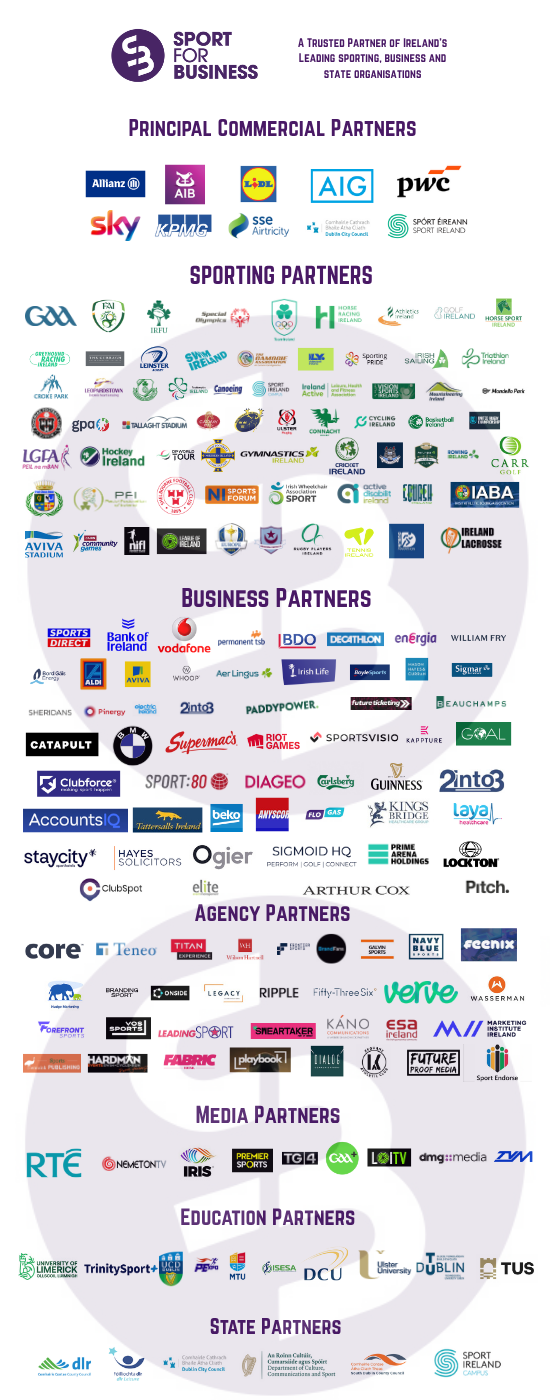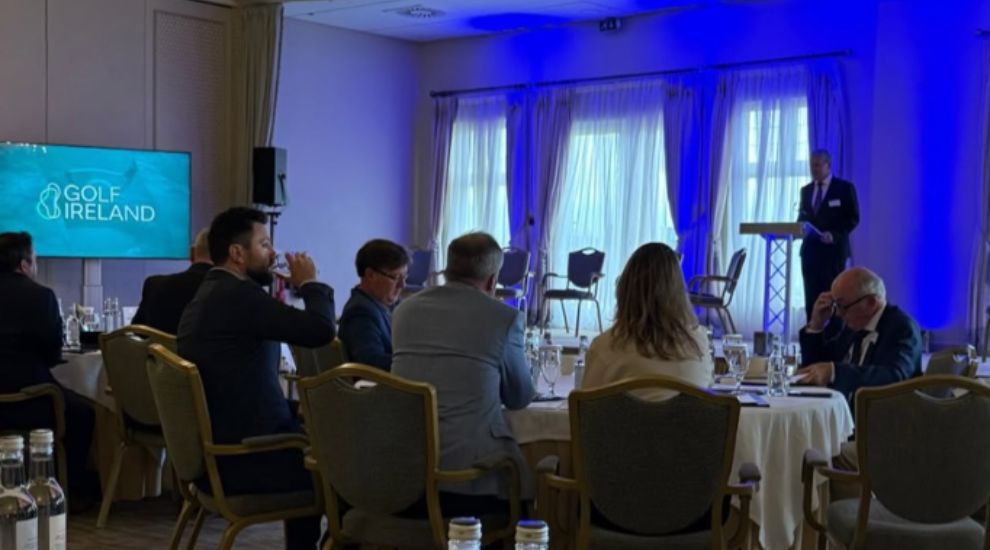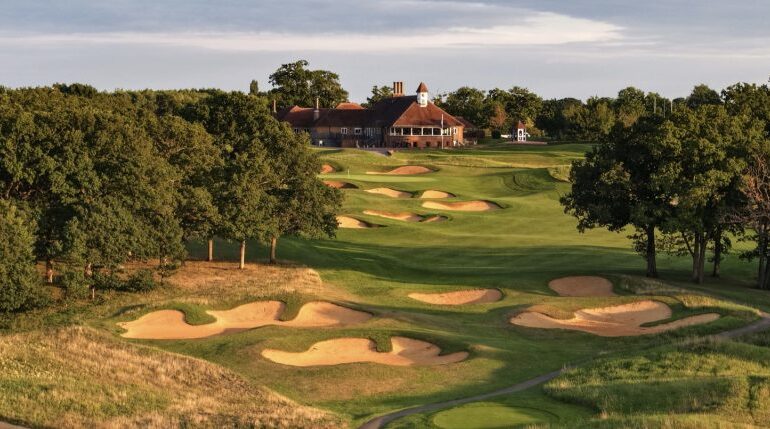Rory McIlroy and Shane Lowry were out on the course but in the clubhouse at the K Club’s South Course yesterday morning an event was taking place that will have a greater long term impact on the sport than any single round of golf.
The Sustainability in Golf Forum, organised by Golf Ireland and hosted by Rob Hartnett of Sport for Business, was ambitious in its plan but grounded in the need to get things done.
If golf is to thrive in the decades ahead, its custodians know it must be as much about conserving nature and cutting emissions as it is about fairways and greens.
What emerged across the morning was a picture of golf as a sport with both scale and responsibility.
With 377 affiliated clubs, more than 225,000 members, and an economic contribution valued at €717 million annually, golf has a reach that matters. It also has a land footprint and energy profile that makes it central to Ireland’s response to the climate crisis.
As the line up of great speakers and contributors from across the industry confirmed, the question is not whether golf engages with sustainability, but how—and how quickly.
Driving the Green with Vision and Practice
The agenda was framed by Ann Courtney, Head of Sustainability at Golf Ireland.
She laid out the organisation’s Climate Action Plan, which mirrors national policy in aiming for a 51% reduction in greenhouse gas emissions by 2030. That headline figure comes with substance.
Through its flagship initiative, Drive the Green, Golf Ireland is encouraging clubs to think beyond short-term fixes and embed sustainability across four pillars: fostering nature, conserving resources, tackling climate action, and strengthening communities.
Courtney pointed to projects already underway. Solar panels have been installed at clubs with “strong returns on investment.” Energy-efficient LED lighting has cut electricity bills while lowering emissions. At Irish Open events, a deposit-and-return scheme for cups and bottles has reduced waste. Clubs undertaking biodiversity audits are producing 10-year ecological plans tailored to their local environment.
But it is not just about isolated projects. Golf Ireland’s Leader Sustainability Programme offers clubs expert support, free audits, data-collection tools, and guidance on funding opportunities. The ambition, Courtney stressed, is to make sustainability less daunting by providing practical, replicable roadmaps.
Yet she acknowledged barriers. Chief among them: capital investment. Many clubs recognise the long-term benefit of renewable energy or water-harvesting systems but cannot afford the upfront cost. Her proposal: a “Sport Forever Infrastructure Fund”, allowing clubs to finance projects with loans repaid from the savings generated. That, she argued, would combine climate responsibility with financial prudence.
The Panels
Each of three expert panels guided the room though three different specific challenges.
The opening discussion on Biodiversity, Water & Plant Production Products brought together voices from policy, regulation, and the fairways. Declan Kealy of the Department of Agriculture and Jim Moriarty from the Environmental Protection Agency set the scene with a national and regulatory perspective, while Lenny O’Callaghan of Malahide Golf Club and Jerry Grant of Uisce Éireann and Bray Golf Club shared practical experience from the club and water management side. The session was guided by Alan Lauder, Golf Ireland’s Ecology Expert, who drew the threads together.
Attention then turned to the challenge of running Sustainable Sporting Events. The panel combined international and domestic expertise: Maria Grandinetti-Milton, Director of Sustainability with the European Tour Group, outlined how global tournaments are embedding best practice; Alan MacDonnell of Adare Manor Golf Club spoke from the perspective of a leading Irish venue preparing for world-stage events; and Colin O’Brien of Croke Park Stadium contributed the insights of a national stadium long recognised for its sustainability leadership. The conversation was facilitated by Jonathan Smith of the GEO Sustainable Golf Foundation.
The third element was a deep dive into Energy & Climate, where the focus was firmly on decarbonisation. Barry Murphy of Flogas Ireland explored energy solutions for clubs; John Kemp of The R&A offered an international governing body’s perspective; while Ultan Herr of Dundalk Golf Club and James Curran of Bandon Golf Club spoke about the real-world challenges and opportunities at club level. The session was steered by Jim Young, Golf Ireland’s Decarbonisation Expert, who framed the discussion around both ambition and action.
The Scale of Golf, the Need for Resources
If Courtney laid out the architecture, Gráinne Kelleher, head of GreenBroker Consulting, brought perspective from years of working at the interface of environment and sport. She praised the Leader Programme for its expertise and peer-to-peer learning model but stressed that without capital, progress will stall.
Kelleher reminded delegates of golf’s scale: 7.3 million rounds played each year, 15,600 jobs supported, and hundreds of local communities tied into the sport’s ecosystem. That makes sustainability in golf not just a niche concern but a mainstream one.
Her vision was clear. Every club should complete an ecology audit. Every club should have a long-term biodiversity plan. Substantial amounts of waste should be diverted from landfill. Irrigation should be supported by harvested rainwater rather than mains supply.
For that to happen, clubs need both knowledge and money. Golf Ireland, she noted, is doing well on the knowledge side, but the funding gap remains stark. “Sustainability costs money,” she said plainly, “and clubs cannot bridge that gap alone.”
She gave us three parting takeaways to bring back to the sport.
An accessible capital fund for clubs to finance major projects.
Engaging hearts and minds with non-preachy, data-driven communication that makes sustainability relatable.
Collaboration beyond golf, tapping into expertise from other sports, local authorities, and regulators.
The pragmatism of her message underscored why golf’s sustainability journey must be about system change as much as individual action.
Leadership, Stewardship, and Practical First Steps
The closing word came from Tracey Bunyan, Chief Operating Officer of Golf Ireland, in conversation with host Rob Hartnett. If Courtney had set the strategy and Kelleher the challenge, Bunyan’s role was to connect both with day-to-day realities.
She began by crediting Golf Ireland’s Sustainability Committee for their “warp speed” progress under the current strategic plan, Golf for Everybody. Sustainability, she said, is now a core pillar, with two guiding principles:
Leadership through embedding sustainability into board agendas, management decisions, and resourcing.
And stewardship in supporting clubs “where they are” on the journey, recognising that not every club moves at the same pace.
The starting point, Bunyan argued, is not grand projects but reaching out, auditing, and acting on low-hanging fruit. Clubs can begin by scrutinising their energy bills, exploring waste management changes, or adjusting operating procedures—small shifts that save money as well as emissions. “A lot of sustainability,” she said, “is just operating procedural change sometimes.”
But she echoed Kelleher’s call for structural support. The perception that golf clubs are wealthy is misleading, she argued: “Some do have resources, the majority don’t.”
For real progress, there must be seed funding or loan schemes, whether through the Sports Capital Programme, the Large Scale Infrastructure Fund, or a new ring-fenced mechanism.
“We are the change makers. We are the custodians. There is a generation coming behind us, and they will expect what we do now to be the norm.”
Cathedral Thinking
Hartnett closed the event with a metaphor. The Basilica of the Sagrada Família in Barcelona was started in 1882, still unfinished decades later, but always driven by a vision of cathedral thinking: doing today what future generations will finish and inherit.
That, he suggested, is golf’s sustainability task. To take small steps and big, to test and fail and try again, and to pass on a sport that is stronger, greener, and more embedded in community life.
“This,” he said, “is probably the most important thing we as a generation of sporting leaders can gift to the future.”
From Words to Action
Golf in Ireland is already on the sustainability path but will only accelerate with funding, collaboration, and shared knowledge.
For a sport often seen as traditional, the message was refreshingly forward-looking. Golf Ireland is not waiting for others to act. It is building structures, offering expertise, and pressing government to match ambition with resources.
The key is to take one small action, one big investment, and one generation at a time.
Further Reading for Sport for Business members:
Check out more of our Sport for Business coverage of Sustainability
SPORT FOR BUSINESS AUTUMN EVENTS

On Wednesday, September 10th, we will host a special event looking at Future Proofing Irish Sport, including the use of AI in sport.

Then on September 25th we will host our Annual Children in Sport Conference, on October 14th, our Annual Sport for Social Good Event, in November a new event focused on Sustainability in Sport and in December our 12th Annual Women in Sport Conference, in partnership with Lidl.
Find out More about Our Sport for Business Events Programme Here
BOOK YOUR EARLY BIRD TICKETS FOR THESE EVENTS HERE
The Latest Sport for Business Podcasts
MEMBERSHIP AND EVENTS
Golf ireland and the Department of Culture, Communications and Sport, as well as all the leading sporting and business organisations in and around the world of sport are among the 300+ members of the Sport for Business community.
This includes all of the leading sports and sponsors, as well as commercial and state agencies, individuals interested in our world, and an increasing number from beyond these shores taking a keen interest in Ireland.
Find out more about becoming a member today.
Or sign up for our twice-daily bulletins to get a flavour of the material we cover.
Sign up for our News Bulletins here.









